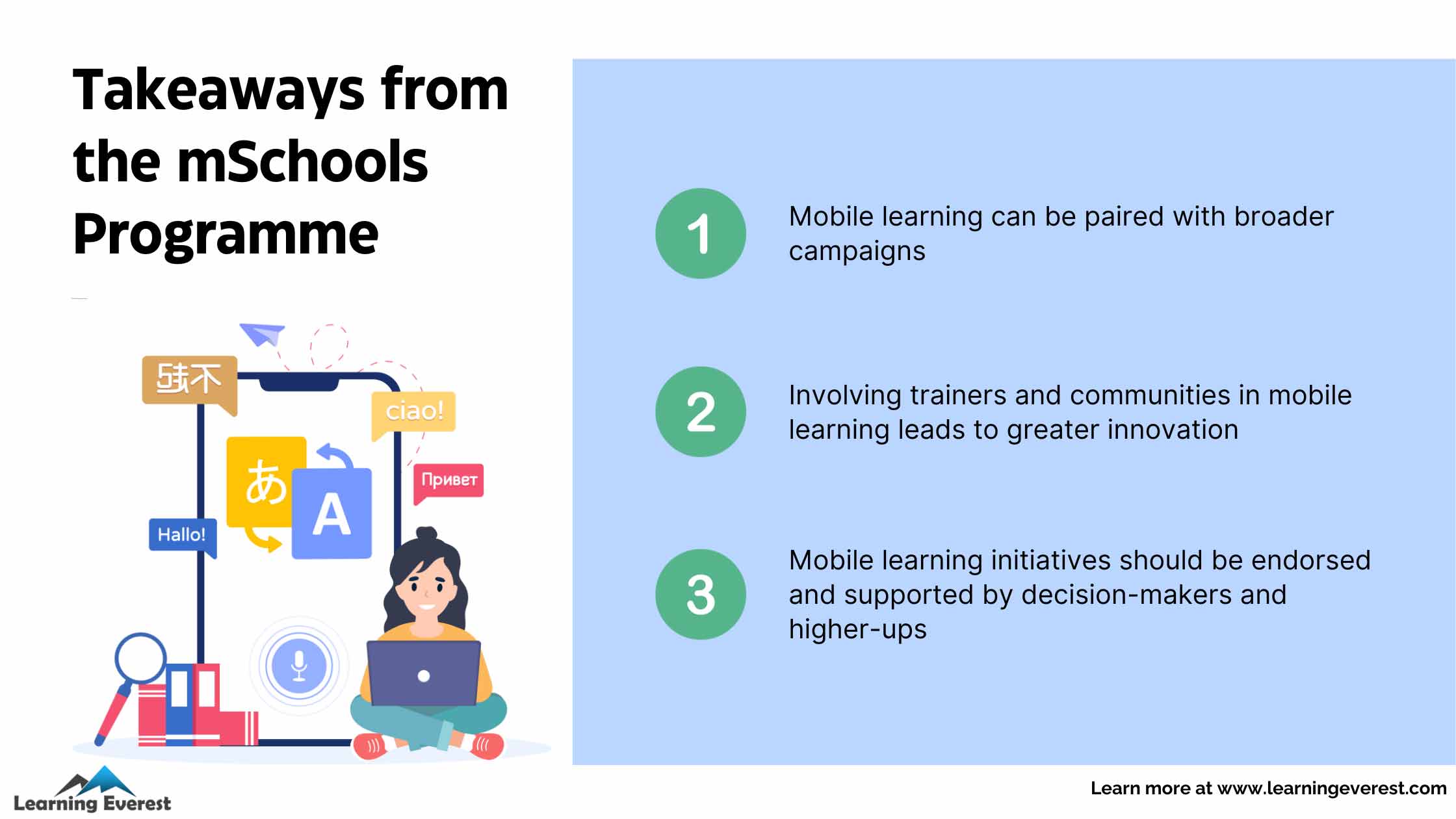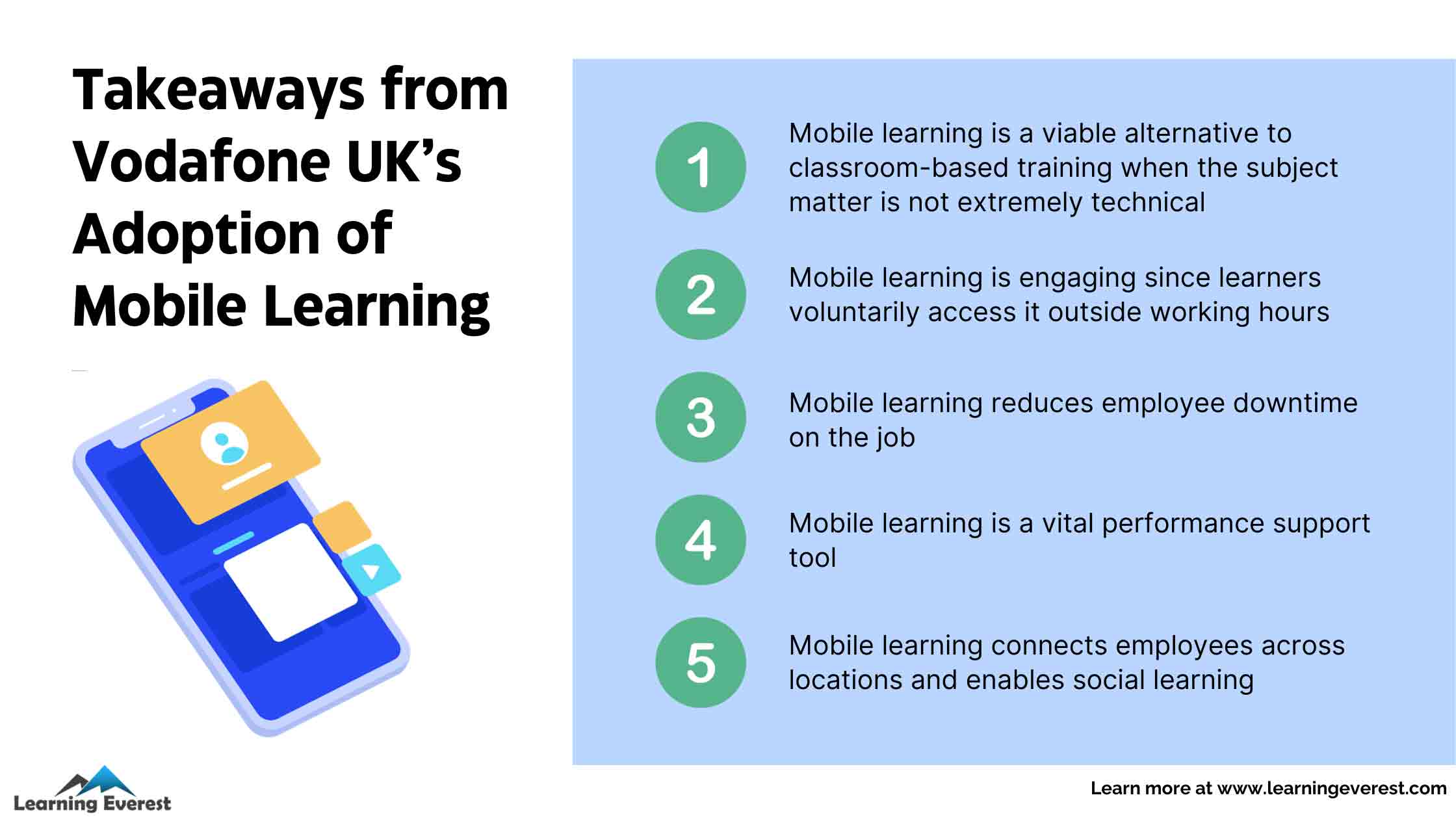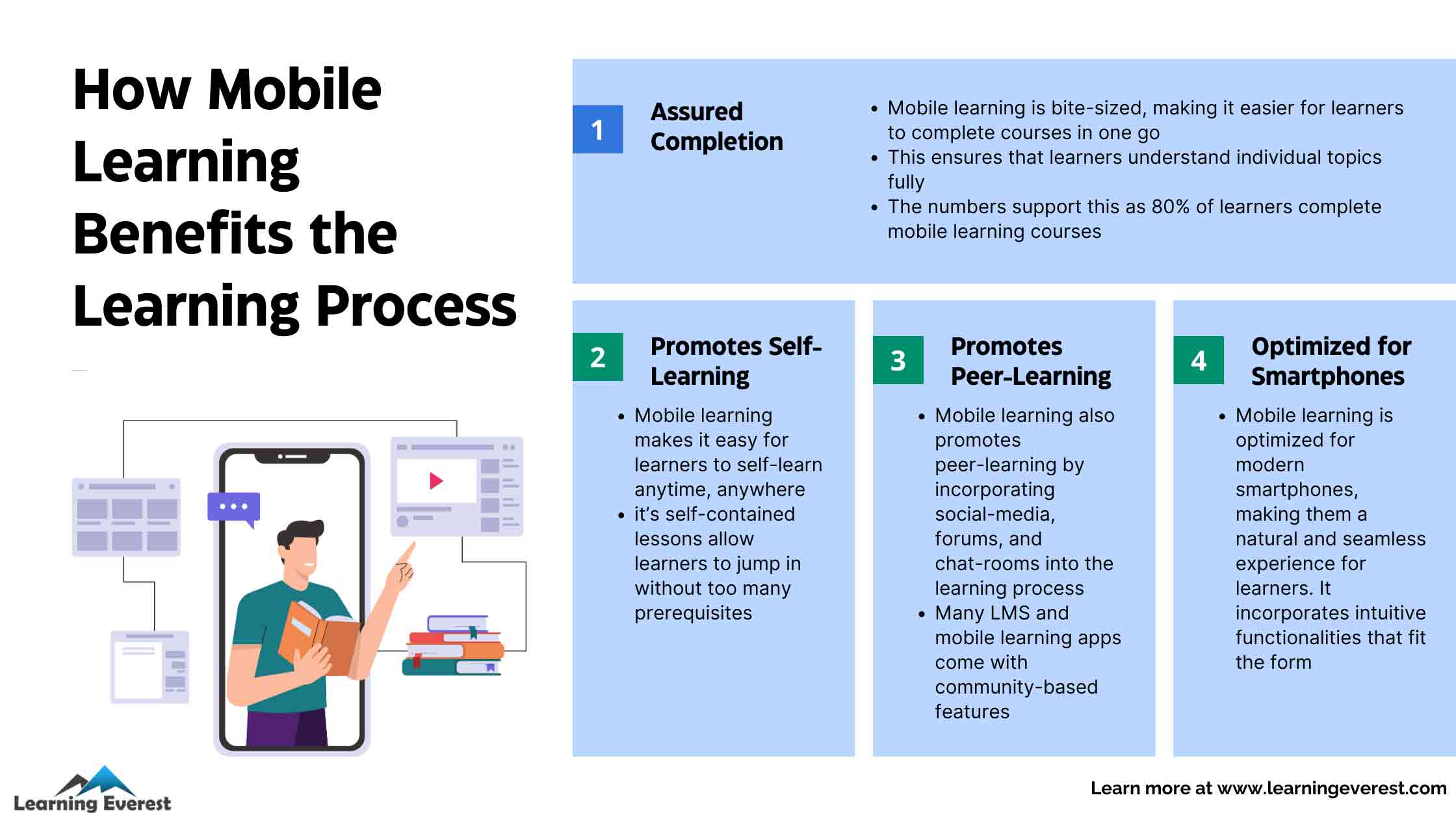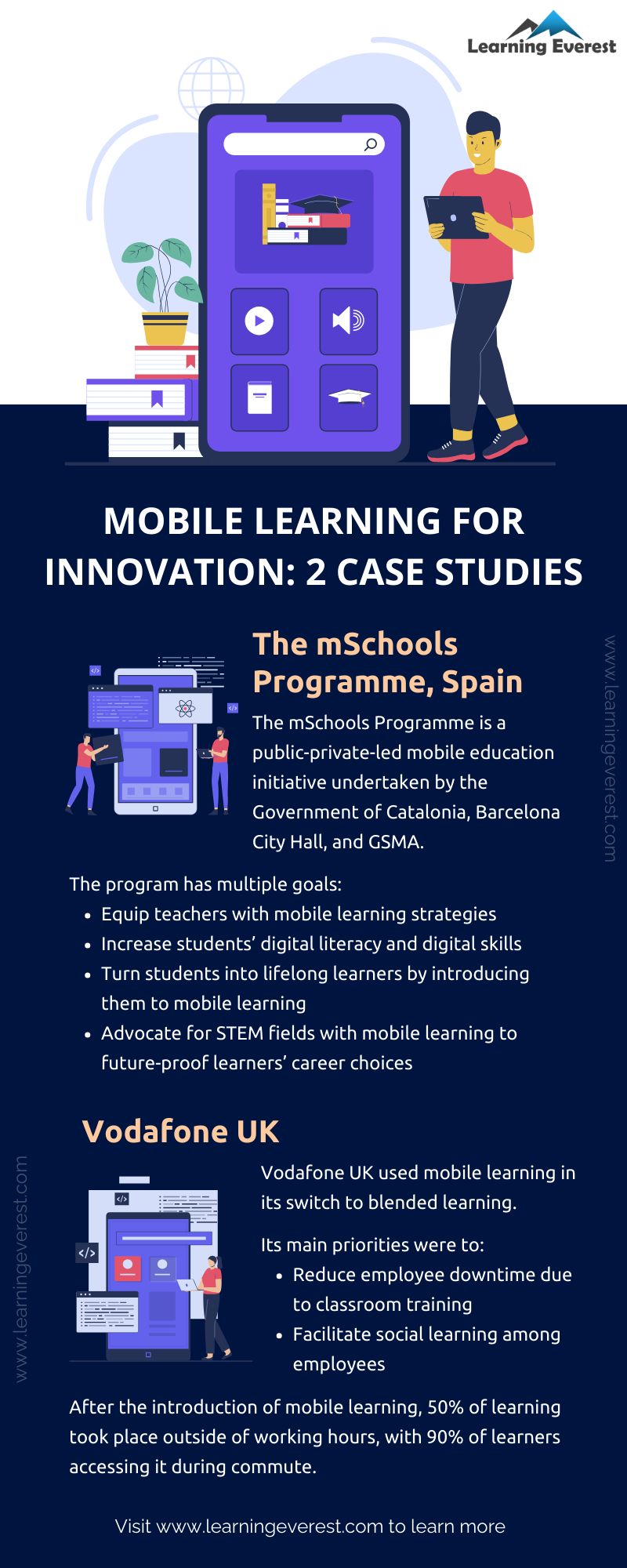Mobile learning for Innovation has taken the world by storm in recent years, with industries and the education sector cashing in on its many benefits. Mobile learning has something to offer to all learner groups, from remote learners pursuing education to office employees with busy schedules. The rich features modern mobile phones offer make them incredibly versatile learning devices that can support numerous learning needs. Are you curious about how organizations and educational institutions put mobile learning to use? Read on to explore 2 mobile learning for Innovation case studies that showcase its use in education and corporate learning.
Table of Contents
- Mobile Learning for Innovation Case Study #1: The mSchools Programme, Catalonia, Spain
- Mobile Learning for Innovation Case Study #2: Vodafone UK
- Conclusion
- Infographic
- Knowledge Check
- Frequently Asked Questions (FAQs)
- What are the advantages of mobile learning?
- What is mobile learning education?
- What is mobile learning and its importance?
- References
Mobile Learning for Innovation Case Study #1: The mSchools Programme, Catalonia, Spain
The mSchools Programme is a public-private-led mobile education initiative undertaken by the Government of Catalonia, Barcelona City Hall, and GSMA.
The project seeks to tackle multiple goals:
- Equip teachers with actionable mobile learning strategies they can utilize in their classrooms
- Increase the adoption of mobile learning among school-going students to increase their digital literacy and skills
- Use mobile learning to transform students into lifelong learners so they remain adaptable in a changing job market
- Advocate for STEM fields through mobile learning to future-proof learners’ career choices for a digital economy
- Build creativity and critical thinking skills in learners
The program has various initiatives that support these goals, namely, online platforms, curriculums, pedagogical methodologies, and events where educators get to refine their approach. According to the mSchools Programme’s UNESCO report, the goals of these initiatives are to “educate, transform, collaborate, and compete.”
Given the breadth of the goals of the mSchools Programme, its implementation covers various domains.
- Schools that are part of the program receive downloadable mobile education curricular materials. These can be uploaded to each school’s LMS and accessed without the need for complex infrastructure. The offline deployability of these materials ensures that they are accessible. While internet connectivity is preferred, learners don’t lose out on quality learning without it and can connect to a network for updates and syncing.
- An online repository of mobile learning content called “Toolbox” is available to teachers, students, and parents. The most recent tally of registered teachers on Toolbox is from 2018 at 1709.
- Learners also receive hands-on application-based learning using open-source tools and software that are accessed on the school’s devices.
- Teachers receive training from the Ministry of Education of Catalonia on the use of mobile technology in classrooms.
- To recognize and reward innovation, the mSchools Programme provides “Mobile Learning Awards” to teachers and schools that implement mobile learning.
Since mSchools blends mobile education with classroom education, a lot of its initiatives also involve offline engagement and routine classroom education. Hence, mobile learning tools for students and teachers supplement classroom training
Additionally, the mSchools Programme holds various events for teachers and students. For teachers, the events focus on enabling them to socialize and exchange ideas to promote innovative pedagogical approaches that incorporate digital learning. For students, the events build their technical and digital prowess in STEM fields.

Mobile Learning for Innovation – Takeaways from the mSchools Programme
Takeaways From the mSchools Programme
The mSchools mobile learning case study highlights a few key points about the possibilities mobile learning opens up in school education, as well as in other learning contexts:
- Mobile learning can be paired up with and even drive broader learning campaigns to build lasting learning habits in individuals.
- Involving trainers and communities in mobile learning inevitably leads to greater innovation, making the medium richer and more effective.
- In the mSchools Programme, it has been seen that top-down implementation of the initiative had the best outcomes, indicating that mobile learning initiatives should be endorsed and supported by decision-makers and higher-ups.
To summarize, mobile learning is not only a tool for quick, bite-sized learning, but can form the building blocks of attitudinal shifts, digital literacy, and scalable campaigns and initiatives.
Mobile Learning for Innovation Case Study #2: Vodafone UK
The following mobile learning case study from the leading telecommunications company, Vodafone, is an excellent example of how a lot of big corporations use mobile learning.
In 2015, Vodafone UK made a switch to blended learning, with mobile learning as the digital medium of their choice.
There were 3 major reasons behind this switch.
- First, Vodafone wanted to reduce the amount of downtime classroom training produced by keeping their retail employees away from stores for long periods of time.
- Secondly, the company was looking for a way for high-performing employees to share their knowledge, learnings, and approach to work with other employees across branches.
- Third, Vodafone wanted a more reliable communication channel than email and paper to relay significant job-related information to employees.
Mobile learning was able to check all these boxes. Hence, Vodafone UK adopted a mobile-first approach where learners had 24*7 access to learning content on their mobile devices via an app. The classroom learning content was turned into bite-sized video-based snippets, ranging from animated scenarios to facilitator-led recordings.
To facilitate social learning and widespread transfer of knowledge from high-performing employees, the mobile app also had a feature for employees to make, share, and interact with posts. These posts became a way for the Vodafone UK employees to exchange their experiences and learnings across locations.
The learning app also had a search engine where learners could manually look for specific topics. This enabled just-in-time performance support, allowing learners to fine-tune their performance on a need-basis.
Vodafone UK saw very favorable outcomes after adopting this mobile-first approach to employee training. They were successfully able to reduce classroom training time. It was seen that 50% of learning took place outside of employees’ working hours, especially during their commute. It was also seen that 90% of learners accessed training content on their own devices. Thus, mobile learning was able to reduce employee downtime during work and also motivated them to invest time outside of working hours into completing the short lessons.
Takeaways from Vodafone UK’s Adoption of Mobile Learning
Vodafone UK’s use of mobile learning highlights just how impactful mobile learning can be. Some of the key takeaways from this example are:
- Mobile learning is a viable alternative to classroom-based training as long as the subject matter is not extremely technical
- Mobile learning is engaging since learners voluntarily access it outside of working hours
- Because learners readily access mobile learning outside of working hours, it reduces employee downtime on the job
- Mobile learning can act as a vital performance support tool to improve employees’ on-the-job performance as and when the need arises
- Mobile learning connects employees across locations and enables social learning

Mobile Learning for Innovation – Takeaways from Vodafone UK’s Adoption of Mobile Learning
Conclusion
The two case studies mentioned in this article showcase mobile learning’s range of usage. It can seamlessly be incorporated into formal education, as well as corporate training. Mobile learning is great as a stand-alone learning tool for just-in-time learning and performance support, but it can also supplement other training formats. In recent years, mobile learning has seen rapid adoption in corporate training and the education sector.
Like Spain’s mSchools Programme, digital literacy through mobile learning is slowly becoming a must-have in modern curriculums. At the same time, businesses are realizing mobile learning’s potential to decrease training times without compromising on the quality of learning they provide. Mobile learning is a flexible and versatile tool that is accessible and has room for immense innovation.

Mobile Learning for Innovation – How Mobile Learning Benefits the Learning Process
Infographic
Knowledge Check
Frequently Asked Questions (FAQs)
What are the advantages of mobile learning?
Mobile learning is a flexible and versatile tool that is accessible and has room for immense innovation.
What is mobile learning education?
Mobile learning education is blended or fully digital learning experiences built for and delivered via mobile devices.
What is mobile learning and its importance?
Mobile learning is learning built for and delivered via mobile devices. It is great as a stand-alone learning tool for just-in-time learning and performance support, but it can also supplement other training formats, like blended learning. It is gaining rapid adoption in formal education and corporate training.
References
Forn A., et al. (2019). mSchools: Transforming the education landscape in Catalonia (Spain) through a systemic and inclusive mobile learning programme: case study by the UNESCO-Fazheng project on best practices in mobile learning. UNESCO.






